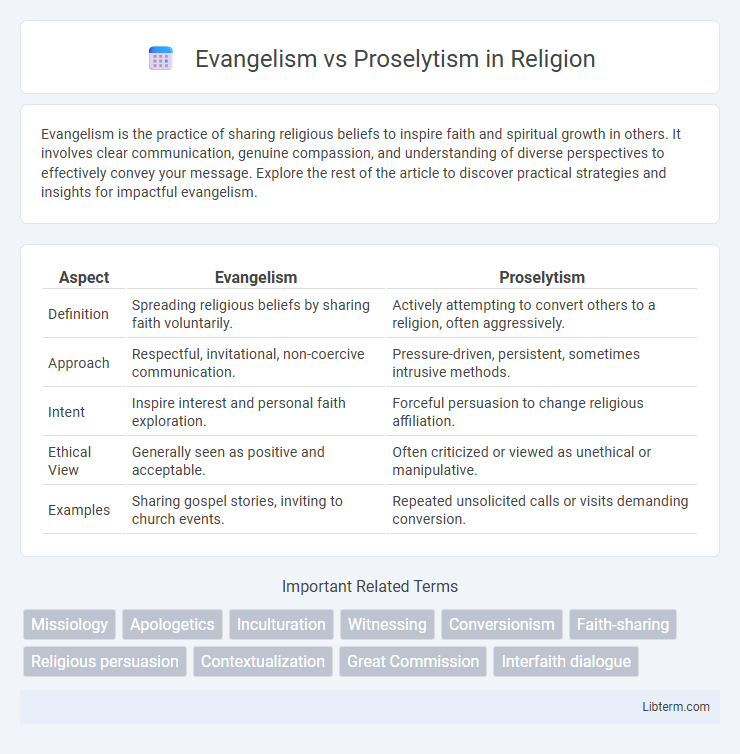Evangelism is the practice of sharing religious beliefs to inspire faith and spiritual growth in others. It involves clear communication, genuine compassion, and understanding of diverse perspectives to effectively convey your message. Explore the rest of the article to discover practical strategies and insights for impactful evangelism.
Table of Comparison
| Aspect | Evangelism | Proselytism |
|---|---|---|
| Definition | Spreading religious beliefs by sharing faith voluntarily. | Actively attempting to convert others to a religion, often aggressively. |
| Approach | Respectful, invitational, non-coercive communication. | Pressure-driven, persistent, sometimes intrusive methods. |
| Intent | Inspire interest and personal faith exploration. | Forceful persuasion to change religious affiliation. |
| Ethical View | Generally seen as positive and acceptable. | Often criticized or viewed as unethical or manipulative. |
| Examples | Sharing gospel stories, inviting to church events. | Repeated unsolicited calls or visits demanding conversion. |
Defining Evangelism and Proselytism
Evangelism involves sharing religious beliefs with the intent to inspire interest and personal spiritual growth, often emphasizing respectful dialogue and voluntary acceptance. Proselytism refers to aggressive or coercive efforts to convert individuals, sometimes disregarding their existing beliefs or consent. While both involve spreading faith, evangelism prioritizes relational engagement, whereas proselytism is associated with pressure or manipulation.
Historical Perspectives on Evangelism and Proselytism
Historical perspectives on evangelism trace its roots to early Christian missions emphasizing spreading the gospel through persuasion and service, contrasting with proselytism, which often involved more aggressive or coercive conversion tactics. Throughout history, evangelism maintained a focus on voluntary faith-sharing, while proselytism sometimes aligned with colonial or political agendas to impose religious beliefs. Key examples include the early apostles' missionary journeys for evangelism and the more forceful conversions during the Crusades and colonial expansions representing proselytism.
Motivations Behind Evangelism and Proselytism
Motivations behind evangelism often stem from a desire to share personal faith experiences and foster spiritual growth within communities, emphasizing respectful dialogue and voluntary acceptance. In contrast, proselytism typically involves an intent to convert others forcibly or through pressure, driven by the aim to increase the number of adherents regardless of individual consent. Understanding these distinctions highlights the ethical implications and social dynamics influencing religious outreach strategies.
Methods and Approaches: Evangelism vs Proselytism
Evangelism employs relational and invitational methods, focusing on sharing beliefs through personal testimony, genuine dialogue, and respectful communication to inspire voluntary faith exploration. Proselytism often uses aggressive or coercive tactics, pressuring individuals to adopt a specific religion without open discussion or respect for existing beliefs. The distinct approaches influence the effectiveness and ethical considerations of spreading religious messages, with evangelism emphasizing mutual respect and proselytism risking alienation.
Ethical Considerations in Religious Outreach
Evangelism emphasizes sharing religious beliefs through respectful dialogue and personal example, prioritizing individual freedom and informed consent in religious outreach. Proselytism often involves aggressive or coercive tactics that can undermine autonomy and raise ethical concerns about manipulation or pressure. Upholding ethical standards requires balancing the right to express faith with respect for diverse beliefs and voluntary decision-making.
Cultural Impacts of Evangelism and Proselytism
Evangelism and proselytism differ in their cultural impacts, with evangelism often emphasizing respectful cultural exchange and dialogue that can foster mutual understanding and preserve indigenous traditions. In contrast, proselytism may lead to cultural disruption by imposing beliefs aggressively, sometimes eroding established customs and social structures. The cultural consequences of these practices influence community cohesion, identity, and the preservation or transformation of cultural heritage.
Legal Frameworks and Religious Freedom
Legal frameworks around evangelism and proselytism vary significantly, with many countries enshrining religious freedom while imposing restrictions on aggressive proselytism to prevent coercion or undue influence. International human rights instruments like the ICCPR protect the right to manifest religion individually or in community, supporting peaceful evangelism but often drawing lines against forced conversions. Balancing these protections, states adopt diverse statutory measures to maintain public order and respect for cultural plurality, reflecting ongoing tensions between religious expression and safeguarding individual autonomy.
Psychological Effects on Converts
Evangelism and proselytism impact converts differently on a psychological level, with evangelism often fostering voluntary acceptance and positive identity integration through gentle persuasion and dialogue. Proselytism may induce stress, identity conflict, or social alienation due to coercive tactics or aggressive conversion demands. Understanding these psychological effects is crucial for religious groups aiming to support mental well-being and authentic spiritual growth in new adherents.
Contemporary Examples and Case Studies
Contemporary examples highlight the distinction between evangelism and proselytism through approaches like Campus Crusade for Christ's respectful dialogue efforts contrasted with aggressive conversions seen in some New Religious Movements. Case studies from India reveal how evangelism often involves community service and interfaith dialogue, while proselytism can trigger social tensions and legal restrictions under anti-conversion laws. Research on global NGO activities shows that evangelism prioritizes voluntary faith sharing, whereas proselytism frequently involves coercive tactics impacting religious freedom.
Building Respectful Interfaith Dialogue
Evangelism encourages sharing beliefs through open, respectful conversations that foster understanding without coercion, emphasizing mutual respect in interfaith dialogue. Proselytism, often perceived as aggressive persuasion, can hinder trust and create resistance in diverse religious settings. Building respectful interfaith dialogue requires prioritizing empathy, active listening, and recognizing shared values to promote harmony and peaceful coexistence.
Evangelism Infographic

 libterm.com
libterm.com